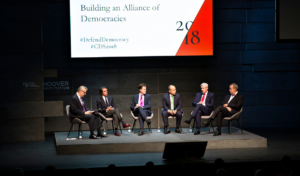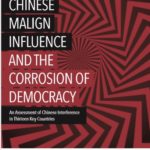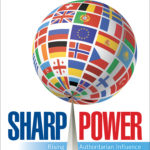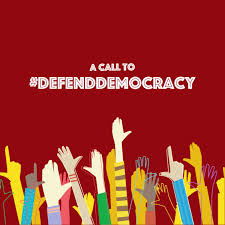
Alliance of democracies
The U.S.-led countries of the trans-Atlantic alliance and their democratic East Asian allies lack a strategy for dealing with their most formidable competitor: China. But the Chinese Communist Party (CCP) has a strategy for dealing with these opponents, argues Edward Lucas, formerly a senior editor at The Economist, now a senior vice-president at the Center for European Policy Analysis (CEPA), a partner of the National Endowment for Democracy (NED).
The United States and its allies, by contrast, lack leadership and goals. This is not a conflict of means. It is a contest based on respective capabilities in willpower and coordination. The world’s major democracies do not lack resources. They lack the purpose, prioritization, and creativity to focus their resources in a meaningful and effective way. Most of all, they lack leadership. This global anti-China alliance needs a strategy. It would involve decisions about goals, leadership, alliances, and priorities. It must feature new thinking, decisive leadership, and hard choices, he writes for Foreign Policy:
- The first priority is the preservation of political and cultural freedoms and the independence of democratic legal systems. The Chinese party-state expects the whole world to bite their tongues on issues it deems out of bounds, from genocide in Xinjiang to repression in Hong Kong. …
 Next is collective action against other CCP intimidation and influence operations, such as its focus on isolating Taiwan. Joint symbolic and practical international action in support of the island democracy is not just a tactical win but a strategic one. It counters the CCP’s projection of inevitability, and it strengthens the best counterexample to CCP propaganda: the existence of a free, prosperous, law-governed “other China”…..
Next is collective action against other CCP intimidation and influence operations, such as its focus on isolating Taiwan. Joint symbolic and practical international action in support of the island democracy is not just a tactical win but a strategic one. It counters the CCP’s projection of inevitability, and it strengthens the best counterexample to CCP propaganda: the existence of a free, prosperous, law-governed “other China”…..- Third, the world’s democracies need to puncture the climate of impunity. The United Front Work Department runs China’s clandestine and avowed foreign influence operations. Exposing and countering its efforts should be the central tactical goal of all allied efforts….
- Fourth, the U.S.-led alliance should exploit the CCP’s vulnerabilities, ranging from its shaky historical legitimacy to individuals in the ruling caste with personal ties to Western countries and other democracies, these states can integrate their cross-border criminal justice, intelligence, and financial regulatory efforts to expose corruption and influence-peddling in CCP weaponized infrastructure projects, for example. …RTWT

National Endowment for Democracy (NED)
Some observers view competition with China and Russia largely through a realpolitik lens, christening a new era in foreign policy as one of “great power competition.” But the incoming U.S. administration is more likely to cast the matter in ideological terms, seeing the situation not just as a contest among nations for power, but also as a struggle of like-minded democracies against rising authoritarianism, the Post’s
“To counter Russian aggression, we must keep the [NATO] alliance’s military capabilities sharp while also expanding its capacity to take on nontraditional threats, such as weaponized corruption, disinformation, and cybertheft,” Biden wrote in a January article in Foreign Affairs. “We must impose real costs on Russia for its violations of international norms and stand with Russian civil society, which has bravely stood up time and again against President Vladimir Putin’s kleptocratic authoritarian system.”
 It is time to convene a summit of democracies at a time when autocracies are on the offensive against the free world, notes one observer. China is picking off democratic states with strategic investments and trying to mould the rules-based order in its image of state subsidies and authoritarian tech. Russia is sparking disorder around the free world with disinformation campaigns, election meddling and corrupt money flows, says Jonas Parello-Plesner of the Alliance of Democracies.
It is time to convene a summit of democracies at a time when autocracies are on the offensive against the free world, notes one observer. China is picking off democratic states with strategic investments and trying to mould the rules-based order in its image of state subsidies and authoritarian tech. Russia is sparking disorder around the free world with disinformation campaigns, election meddling and corrupt money flows, says Jonas Parello-Plesner of the Alliance of Democracies.
In her op-ed “Biden’s ‘summit of democracies’ won’t work” (December 8), Shada Islam argues that interests and values often do not align across the free world. This is true, of course — and one of the problems that such a summit would address, he writes for POLITICO:
Democratic leaders’ short-term economic priorities have led to dependency. Beijing has exploited divisions between governments when it comes to state-subsidized 5G, for example, or the Belt and Road Initiative and one-sided supply chains. That is precisely why we need a joined-up response from democracies. The G20, which the author highlights as the gold standard of efficient international cooperation, is not apt for the job. It is stocked with autocratic spoilers.
The revival of “American leadership together with revitalization of our alliances” and the appointment of officials committed to democracy and human rights is welcomed by two Republican commentators. For example….
 “We both worked with [former NED board member] Linda Thomas-Greenfield (left) at the State Department and expect her to be an outstanding ambassador to the United Nations. As a career foreign service officer for 35 years, she has vast knowledge and experience representing the United States,” John B. Bellinger III and David J. Kramer write for the Bulwark.
“We both worked with [former NED board member] Linda Thomas-Greenfield (left) at the State Department and expect her to be an outstanding ambassador to the United Nations. As a career foreign service officer for 35 years, she has vast knowledge and experience representing the United States,” John B. Bellinger III and David J. Kramer write for the Bulwark.
Looking back on 20 years of authoritarianism, securitization, and polarization, Biden’s entry into office should be a moment for reflection in which the foreign policy establishment eschews “complacent restoration,” as Yale law and history Professor Samuel Moyn wrote recently, and embraces “genuine renovation” when setting forward strategy, argues analyst Larry Attree.
Friends of peace, democracy, and human rights who are in government, in multilateral institutions, and in positions of influence should take heart from the fact that there is so much public activism and appetite for better approaches, he writes for Just Security, including:
- No more blank checks. Learning the bitter lessons of backing authoritarian “partners” such as Nouri al-Maliki, Biden should follow through on his promised “reassessment of our relationship with Saudi Arabia,” go further in applying pressure on Egypt, and do the same with other regional strongmen, requiring marked progress on peace, democracy, and human rights as the price of future security and economic partnerships with the United States.
 Construct an effective alliance for democracy and rights. The new administration should build a common approach among sympathetic governments and civil society allies on how to protect democracy from the current assault [as articulated in the recent NED-IDEA initiative to Defend Democracy]. This means, on the one hand, supporting civil society and peaceful change movements to protect their ability to freely generate demand and pressure for reform. It also means encouraging democratic allies to work in step with the United States to exert real economic, security, and political leverage to incentivize progress on democracy and human rights. Biden’s plan to host a “summit of democracies” next year is a key opportunity to set the agenda on this.
Construct an effective alliance for democracy and rights. The new administration should build a common approach among sympathetic governments and civil society allies on how to protect democracy from the current assault [as articulated in the recent NED-IDEA initiative to Defend Democracy]. This means, on the one hand, supporting civil society and peaceful change movements to protect their ability to freely generate demand and pressure for reform. It also means encouraging democratic allies to work in step with the United States to exert real economic, security, and political leverage to incentivize progress on democracy and human rights. Biden’s plan to host a “summit of democracies” next year is a key opportunity to set the agenda on this.- Refresh the U.S. approach to security challenges. The most urgent step here would be a thorough reappraisal of past approaches to terrorism and violent extremism, including by actively seeking feedback from civil society in the field, with the aim of eliminating counter-productive strategies and practices from the playbook. The next priority would be to redesign U.S. security partnerships to focus much more on reform of institutions and structures and to include more community and civil society engagement, including by building on efforts like the State Department’s Security Governance Initiative. At the same time, the new administration should invest in whole-of-society efforts to tackle root causes of violent conflict, with significant resources and a proper implementation plan for the Global Fragility Act and other efforts to support development, democracy, and human rights.
Senior Biden aide accuses China of ‘assault’ on freedom in Hong Kong https://t.co/TEpm7pjNVR via @financialtimes
— Democracy Digest (@demdigest) December 9, 2020







